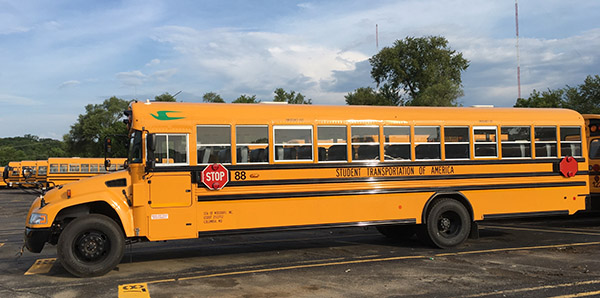KC school district makes ‘simple decision’ with autogas buses
Kansas City Public Schools’ decision to adopt 171 Blue Bird Vision Propane school buses was based on its need for a clean and quiet ride for students. The district transports 9,100 students to 33 schools, two early learning schools and seven special programs via 141 routes each day.

Kansas City Public Schools began its adoption of propane school buses in 2019. Photo courtesy of Student Transportation of America
In a progressive, tech-focused city, Kansas City Public Schools recognized an opportunity to reduce emissions and noise by replacing aging diesel school buses with propane autogas school buses, according to a 2020 case study from the Missouri Propane Education & Research Council (MOPERC).
Kansas City Public Schools began its adoption of propane school buses in 2019 by contracting with Student Transportation of America (STA). STA received a $20,000 rebate from MOPERC’s Clean Bus Replacement Plan in 2019.
The district contracted with STA to acquire the Blue Bird Type C buses equipped with Roush CleanTech propane fuel systems, joining over 1,000 school districts across the U.S. that transport students in propane school buses.
“The economic, safety and environmental benefits of propane-powered school buses were major selling points. Those benefits made it a simple decision for us to choose propane because everyone wins,” says Chris Walls, director of transportation for the district.
In an effort to make fueling convenient and to control costs, Kansas City Public Schools elected to build a propane fueling station. The district’s station includes an 18,000-gallon, aboveground tank located on school grounds, within the gates of the bus barn. The pumps can refill four buses at one time.
Working with Ferrellgas, Kansas City Public Schools locked in an annual per-gallon fuel cost for propane autogas so that price and supply remain consistent, allowing for better budgeting.
By the numbers
A glance at Kansas City Public Schools’ use of propane autogas buses:
- 171 propane autogas school buses
- 16,000 annual miles traveled per bus
- 500,000 gallons of propane autogas per school year
- 60 percent reduction in fuel cost
















